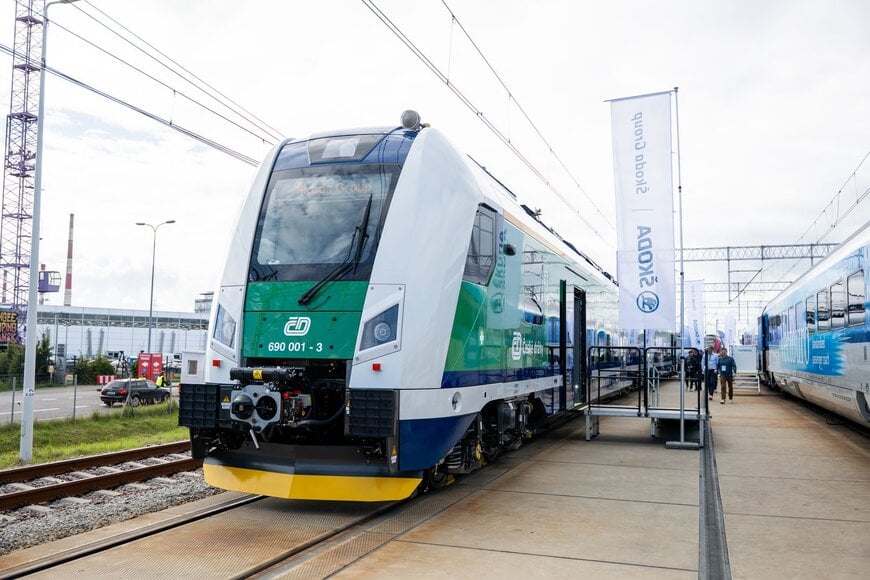Škoda Group Unveils New RegioPanter Battery Trains at TRAKO 2025
International premiere in Gdańsk highlights next-generation BEMU units for České dráhy and the Moravian-Silesian Region, entering service from 2027.
www.skoda.cz

The international premiere of the new generation of RegioPanter battery trains (BEMU) took place at the TRAKO 2025 trade fair in Gdańsk, Poland. The unit is being presented by Škoda Group, a leader in zero-emission mobility, in cooperation with České dráhy (ČD) and the Moravian-Silesian Region (Czech Republic). This marks the first public presentation of the latest generation of these state-of-the-art battery trains on the international stage. Škoda Group is currently producing 15 new-generation BEMU trains for Czech Railways and their operation in the Moravian-Silesian Region. The trains are scheduled to enter service in early 2027.
The BEMU units combine electric and battery operation. During journeys, they are continuously recharged from catenary, while in non-electrified sections they run on battery power with a range of 80 kilometres. Their maximum speed is 160 km/h under catenary and 120 km/h in battery-only mode. Thanks to regenerative braking, the batteries are also recharged outside electrified sections.
“RegioPanter battery units are clean and efficient solution for regional transport that can be deployed immediately, without waiting for major infrastructure investments. Thanks to the catenary-and-battery concept, which combines continuous charging under overhead lines with battery operation in non-electrified sections, they bring operators lower operating costs and passengers faster, more comfortable, transfer-free connections. We see strong export potential for this solution in many regions – especially in Central and Eastern Europe,” said Petr Novotný, CEO Škoda Group.
“České dráhy has been operating the first four Škoda RegioPanter electric units with batteries in trial service for almost a year. In that time, they have covered half a million kilometres in combined operation, both under catenary and on batteries. This is clear proof that this technology is the future of regional transport. On the Ostrava–Veřovice line, thanks to the new catenary-and-battery trains, we have seen passenger numbers increase by up to twenty percent. With the support of the Moravian-Silesian Region, we became the first operator in the Czech Republic to deploy battery units, and the newly presented train type will soon expand their use across the entire region,” said Michal Krapinec, Chairman of the Board and CEO of České dráhy.
An immediately available solution without major infrastructure interventions
The new generation of RegioPanter battery units builds on the successful operation of the first four battery-equipped electric units in the Moravian-Silesian Region, which have already clocked up more than half a million kilometres. Many countries are considering adopting hybrid propulsion technology to quickly strengthen the role of zero-emission rail as the backbone of public transport. In regions with an extensive network of only partially electrified lines, battery units represent a fast and effective solution. By operating on batteries, they make it possible to deliver the comfort and journey times of electric trains even where older, significantly less eco-friendly diesel units currently run. This increases the attractiveness of public rail transport, improves access to smaller towns, and delivers an immediate environmental benefit without the need for costly and lengthy infrastructure works.
Škoda Group builds on decades of experience with battery vehicles. As early as the 1930s, it manufactured accumulator locomotives; since 2015, its battery-powered trams have been operating in Turkey, capable of running on sections without catenary; and it also produces dual-mode trolleybuses that combine catenary with batteries.
The planned expansion of RegioPanter battery units and their new generation represents an important step not only for the Moravian-Silesian Region and the Czech Republic but also for Europe as a whole. Škoda Group is thereby reaffirming its role as a leader in sustainable mobility and offering operators solutions that combine ecology, efficiency and passenger comfort.
The first four two-car BEMU units, on which the new generation builds, were deployed in the Moravian-Silesian Region in December 2024. In the first ten months, they covered more than 500,000 kilometres in total, almost half of which was in battery mode. Deploying BEMU units translates into annual savings of at least 200,000 litres of diesel and around 500 tonnes of CO₂ emissions. At the same time, the introduction of modern trains and shorter journey times has led to a sharp increase in service quality for passengers, reflected in year-on-year ridership growth of up to 20 percent. This brings further benefits to operators and savings for transport authorities.
Key technical parameters of the new generation of BEMU units
- Number of cars: 2
- Unit length: 52,900 mm
- Width: 2,820 mm
- Height: 4,260 mm
- Number of seats (including 1st class): 150 (8)
- Total passenger capacity: 323
- Continuous power: 4 × 340 = 1,360 kWMaximum speed: 160 km/h in traction mode; 120 km/h in battery mode
- Nominal overhead voltage: 3 kV DC / 25 kV 50 Hz AC
- Alternative drive: electric from battery
- Minimum battery range: 80 km
- Specific power in battery mode: 10.9 kW/t
- Train protection: ETCS L2 BL3 + Class B system

